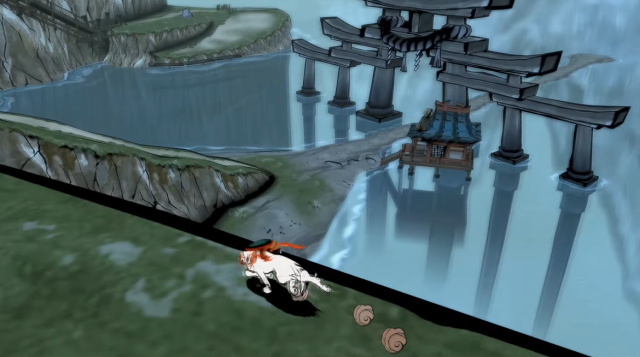Titles from Final Fantasy and Attack on Titan franchises also on list in wake of deaths thought to have stemmed from online bullying.
Were you planning to spend a few lazy afternoons this summer with video game controller in hand, polishing your fighting skills in Final Fantasy Dissidia or Street Fighter V? Or maybe you were looking forward to some less aggressive, but no less satisfying, time wandering through the enchanting Shinto-inspired world of Okami or collecting Japanese spirits in Yo-Kai Watch?
▼ Okami
Well, if you happen to be spending the summer in Saudi Arabia, it’s probably time to think again. On July 15, the Saudi General Commission for Audio-Visual Media banned 47 separate video games. The move comes after the suicides of a boy and girl, 12 and 13 years-old, respectively, who are said to have taken their own lives as part of an online challenge/harassment protocol called “Blue Whale.”
However, unlike in the case of U.K. authorities warning parents after the death of a boy who’d been playing PC game Doki Doki Literature Club last month, none of the games on the General Commission for Audio-Visual Media’s banned list appear to have any direct connection to the Saudi children’s suicides, nor is suicide a common theme throughout them. Some, like Okami and Yo-Kai Watch, are even considered quite kid-friendly in most of the world.
The games on the list that hail from Japanese developers, publishers, or franchises are
● Attack on Titan 2
● Bayonetta 2
● Dead Rising 3 Apocalypse Edition
● Deception IV: The Nightmare Process
● Devils Third DmC – Definitive edition
● Dragon’s Dogma: Dark Arisen
● Final Fantasy Dissidia
● Fist of the North Star: Ken’s Rage 2
● Life is Strange
● Okami
● One Piece Burning Blood
● Resident Evil 5
● Resident Evil 6
● SplatterHouse
● Street Fighter V
● Street Fighter 30th Anniversary
● Yo-Kai Watch
Also included in the ban are Agents of Mayhem, Assassins Creed 2, Clash of the Titans, Dante’s Inferno, Deadpool, Deus Ex Mankind Divided, Dragon Age: Inquisition, Draw to Death, God of War 1, God of War 2, God of War 3, Grand Theft Auto V, Heavy Rain, Hitman: Absolution (2012), Mafia 2, Mafia 3, Metro Redux, Past Cure, Prison Architect, Saints Row IV, The Order 1886, The Saboteur, The Witcher 3, The Nonary Game, Thief, Vampyr, Watch Dogs, Wolfenstein 2, and Wolfenstein: The New Order.
▼ Okami’s Amaterasu, an incarnation of the Shinto sun goddess, runs past a shrine’s torii gateway.
The commission did not expand on the reason the games were banned, instead citing undefined “violations of rules and regulations.” As such, it’s possible that the games on the list simply caught the organization’s attention during a general scrutinizing of online and video game content following the children’s deaths, and were subsequently fluffed for depictions of graphic violence or other aspects deemed unseemly (getting back to Okami and Yo-Kai Watch once more, the games draw heavily from Japanese religious beliefs, mythology, and folklore).
▼ Yo-Kai Watch
The commission has not specified whether the ban simply prohibits the sale of the games, or criminalizes their possession or play.
If you or someone you know is in Japan and having suicidal thoughts, there are people here to help. Click here for more info.
Sources: Yuruku Yaru via Jin, AP, Saudi General Commission for Audio-Visual Media via Gamer Rant
Insert image: YouTube/Capcom USA


 Yo-kai ruin very important meeting at Nintendo
Yo-kai ruin very important meeting at Nintendo Nintendo announces awesome mini NES loaded with 30 games that attaches directly to your TV
Nintendo announces awesome mini NES loaded with 30 games that attaches directly to your TV Why Twitter is awesome: Yo-kai Watch in different art styles
Why Twitter is awesome: Yo-kai Watch in different art styles Yo-Kai Watches selling out everywhere, resourceful kids and parents make their own instead
Yo-Kai Watches selling out everywhere, resourceful kids and parents make their own instead Pikachu and Super Mario left out of lineup of official spokescharacters for Tokyo Olympics
Pikachu and Super Mario left out of lineup of official spokescharacters for Tokyo Olympics McDonald’s new Happy Meals offer up cute and practical Sanrio lifestyle goods
McDonald’s new Happy Meals offer up cute and practical Sanrio lifestyle goods All-you-can-drink Starbucks and amazing views part of Tokyo’s new 170 meter-high sky lounge
All-you-can-drink Starbucks and amazing views part of Tokyo’s new 170 meter-high sky lounge More foreign tourists than ever before in history visited Japan last month
More foreign tourists than ever before in history visited Japan last month Is the new Shinkansen Train Desk ticket worth it?
Is the new Shinkansen Train Desk ticket worth it? Beautiful Sailor Moon manhole cover coasters being given out for free by Tokyo tourist center
Beautiful Sailor Moon manhole cover coasters being given out for free by Tokyo tourist center Hamster abandoned at Tokyo ramen restaurant gets new home
Hamster abandoned at Tokyo ramen restaurant gets new home Disney princesses get official manga makeovers for Manga Princess Cafe opening in Tokyo
Disney princesses get official manga makeovers for Manga Princess Cafe opening in Tokyo Mister Donut ready to make hojicha dreams come true in latest collab with Kyoto tea merchant
Mister Donut ready to make hojicha dreams come true in latest collab with Kyoto tea merchant The oldest tunnel in Japan is believed to be haunted, and strange things happen when we go there
The oldest tunnel in Japan is believed to be haunted, and strange things happen when we go there The Top 5 Boys’ Love Manga in English on digital content library MangaPlaza goes beast mode
The Top 5 Boys’ Love Manga in English on digital content library MangaPlaza goes beast mode We try out “Chan Ramen”, an underground type of ramen popular in the ramen community
We try out “Chan Ramen”, an underground type of ramen popular in the ramen community Starbucks reopens at Shibuya Scramble Crossing with new look and design concept
Starbucks reopens at Shibuya Scramble Crossing with new look and design concept Beautiful new Final Fantasy T-shirt collection on the way from Uniqlo【Photos】
Beautiful new Final Fantasy T-shirt collection on the way from Uniqlo【Photos】 Foreign English teachers in Japan pick their favorite Japanese-language phrases【Survey】
Foreign English teachers in Japan pick their favorite Japanese-language phrases【Survey】 There’s a park inside Japan where you can also see Japan inside the park
There’s a park inside Japan where you can also see Japan inside the park Japanese convenience store packs a whole bento into an onigiri rice ball
Japanese convenience store packs a whole bento into an onigiri rice ball Studio Ghibli releases Kiki’s Delivery Service chocolate cake pouches in Japan
Studio Ghibli releases Kiki’s Delivery Service chocolate cake pouches in Japan Japan’s bone-breaking and record-breaking roller coaster is permanently shutting down
Japan’s bone-breaking and record-breaking roller coaster is permanently shutting down New definition of “Japanese whiskey” goes into effect to prevent fakes from fooling overseas buyers
New definition of “Japanese whiskey” goes into effect to prevent fakes from fooling overseas buyers Foreign passenger shoves conductor on one of the last full runs for Japan’s Thunderbird train
Foreign passenger shoves conductor on one of the last full runs for Japan’s Thunderbird train Our Japanese reporter visits Costco in the U.S., finds super American and very Japanese things
Our Japanese reporter visits Costco in the U.S., finds super American and very Japanese things Kyoto bans tourists from geisha alleys in Gion, with fines for those who don’t follow rules
Kyoto bans tourists from geisha alleys in Gion, with fines for those who don’t follow rules Studio Ghibli unveils Mother’s Day gift set that captures the love in My Neighbour Totoro
Studio Ghibli unveils Mother’s Day gift set that captures the love in My Neighbour Totoro Domino’s Japan now sells…pizza ears?
Domino’s Japan now sells…pizza ears? New Japanese KitKat flavour stars Sanrio characters, including Hello Kitty
New Japanese KitKat flavour stars Sanrio characters, including Hello Kitty Sales of Japan’s most convenient train ticket/shopping payment cards suspended indefinitely
Sales of Japan’s most convenient train ticket/shopping payment cards suspended indefinitely Sold-out Studio Ghibli desktop humidifiers are back so Totoro can help you through the dry season
Sold-out Studio Ghibli desktop humidifiers are back so Totoro can help you through the dry season Japanese government to make first change to romanization spelling rules since the 1950s
Japanese government to make first change to romanization spelling rules since the 1950s Ghibli founders Toshio Suzuki and Hayao Miyazaki contribute to Japanese whisky Totoro label design
Ghibli founders Toshio Suzuki and Hayao Miyazaki contribute to Japanese whisky Totoro label design Doraemon found buried at sea as scene from 1993 anime becomes real life【Photos】
Doraemon found buried at sea as scene from 1993 anime becomes real life【Photos】 Tokyo’s most famous Starbucks is closed
Tokyo’s most famous Starbucks is closed One Piece characters’ nationalities revealed, but fans have mixed opinions
One Piece characters’ nationalities revealed, but fans have mixed opinions We asked a Uniqlo employee what four things we should buy and their suggestions didn’t disappoint
We asked a Uniqlo employee what four things we should buy and their suggestions didn’t disappoint Princesses, fruits, and blacksmiths: Study reveals the 30 most unusual family names in Japan
Princesses, fruits, and blacksmiths: Study reveals the 30 most unusual family names in Japan Studio Ghibli’s new desktop Howl’s Moving Castle will take your stationery on an adventure
Studio Ghibli’s new desktop Howl’s Moving Castle will take your stationery on an adventure Japan’s Hardcore Gamer General Election generates different results from casuals survey…sort of
Japan’s Hardcore Gamer General Election generates different results from casuals survey…sort of Giant Final Fantasy XVI painting station artwork, 3-D video billboard fight appear in Japan【Vid】
Giant Final Fantasy XVI painting station artwork, 3-D video billboard fight appear in Japan【Vid】 Yo-Kai What? Monsters of all kinds plummet from children’s favorite character rankings
Yo-Kai What? Monsters of all kinds plummet from children’s favorite character rankings Get a Peek at Universal Studios Japan’s ‘Death Note- The Escape’ Game in Promo Video
Get a Peek at Universal Studios Japan’s ‘Death Note- The Escape’ Game in Promo Video Final Fantasy’s Cloud gets special illustrated birthday card from designer Tetsuya Nomura
Final Fantasy’s Cloud gets special illustrated birthday card from designer Tetsuya Nomura Japanese politicians want to set daily limit on how much time kids can spend playing video games
Japanese politicians want to set daily limit on how much time kids can spend playing video games Kids rejoice! Universal Studios Japan to get Yo-kai Watch attraction this summer
Kids rejoice! Universal Studios Japan to get Yo-kai Watch attraction this summer Iran becomes first country to completely ban Pokémon GO
Iran becomes first country to completely ban Pokémon GO Get ready to rock! 38 awesome covers of video game music in 17 minutes
Get ready to rock! 38 awesome covers of video game music in 17 minutes Final Fantasy fan art with a Western touch creates illustrations just right for any Disney fan
Final Fantasy fan art with a Western touch creates illustrations just right for any Disney fan Japan’s new ramen vending machine cooks noodles in just 90 seconds, serves four different types
Japan’s new ramen vending machine cooks noodles in just 90 seconds, serves four different types Tekken video game series shows off its first fighter from the Philippines: Josie Rizal 【Video】
Tekken video game series shows off its first fighter from the Philippines: Josie Rizal 【Video】 Japanese actor Haruma Miura found dead at home in Tokyo
Japanese actor Haruma Miura found dead at home in Tokyo Final Fantasy Crystal-flavor fried chicken coming to Japanese convenience stores
Final Fantasy Crystal-flavor fried chicken coming to Japanese convenience stores Using real-world violence to defeat the Street Fighter 6 cast, starring Saori Yoshida【Videos】
Using real-world violence to defeat the Street Fighter 6 cast, starring Saori Yoshida【Videos】 Tokyo Comic-Con explicitly prohibits men from cosplaying as female characters
Tokyo Comic-Con explicitly prohibits men from cosplaying as female characters
Leave a Reply